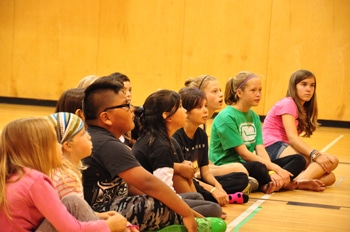The idea was planted in 2009. Su McLeod—family ministry facilitator for the Diocese of British Columbia—attended a Truth & Reconciliation event at the University of Victoria. There, a conversation with Chief Bobby Joseph got her thinking about how to bring together Aboriginal and non-aboriginal young people.

Four years later, in August 2013, McLeod led the first trip for non-aboriginal youth to Alert Bay on Cormorant Island, just off the northeast shore of Vancouver Island. There the youth—aged 11-13—were the guests of the ‘Namgis Nation for an intercultural camp week with Aboriginal youth, with support from the Anglican Healing Fund.
“We chose this age group because they are maturing young people,” says McLeod. “They haven’t really formed their opinions. They’re still very much informed by what their parents are saying, what they’re hearing on the news, what they’re hearing in popular culture—and that’s still not a favourable reflection on Aboriginal people that we’re seeing. So we wanted them to spend time in an Aboriginal community with Aboriginal young people who have the same interests and passions they do—for both groups to come together and find out who each other are. And we really saw that happen.”
Six young people were chosen from different parishes in the diocese. Before the trip, the youth spent some time doing cultural sensitivity training through the Native Friendship Centre in Victoria.
Sessions focused on the Aboriginal peoples of Vancouver Island and the gulf islands—community structure, feasting and potlatch (a gift-giving festival), language, trading, European arrival, and residential schools.
“Aboriginal history is taught in the school system, but it really varies how well that is done. And so these young people were hearing a lot of stuff for the first time,” says McLeod. “There was about a month between the cultural sensitivity training and the actual camp happening—which I think is a good amount of time to allow them to process before actually going to an Aboriginal community.”
The week at Alert Bay gave youth from both communities a chance to tell and listen to stories, make artwork, play games, and to attend community events. The aim was to integrate the camp with what the community was already doing with the hope of building lasting relationships.
That hope is being fulfilled with plans for a feast in Victoria in November with members of the ‘Namgis community there, and another camp during Spring Break 2014. This time, however, youth from Alert Bay will travel south.
The Ven. Dr. Michael Thompson, General Secretary of the Anglican Church of Canada, is enthusiastic about this growing relationship—what he sees as a spontaneous local reaction to the national priority of reconciliation.
“All ministry is local—it all happens somewhere. So we have a national commitment to healing and reconciliation, but that national commitment gets worked out through local ministries,” says Mr. Thompson. “And that’s a response to the question that Mr. Justice Murray Sinclair, the head commissioner of the Truth and Reconciliation Commission, has asked all the churches to ask ourselves: What does reconciliation mean to us?”
Henriette Thompson, General Synod’s public witness coordinator for social and ecological justice, is also encouraged by local efforts, and hopes they will take advantage of national church resources.
“More and more things are bubbling up from the local level,” says Ms. Thompson. “That can be very good because it means that people are really engaged. Sometimes at the national level we have access to resources and services that could support and facilitate the work of local congregations, and help them see the broader national picture as well. What we’d like is for people in parishes to know we’re listening, we’re aware of what’s going on.”
Interested in keeping up-to-date on news, opinion, events and resources from the Anglican Church of Canada? Sign up for our email alerts .
